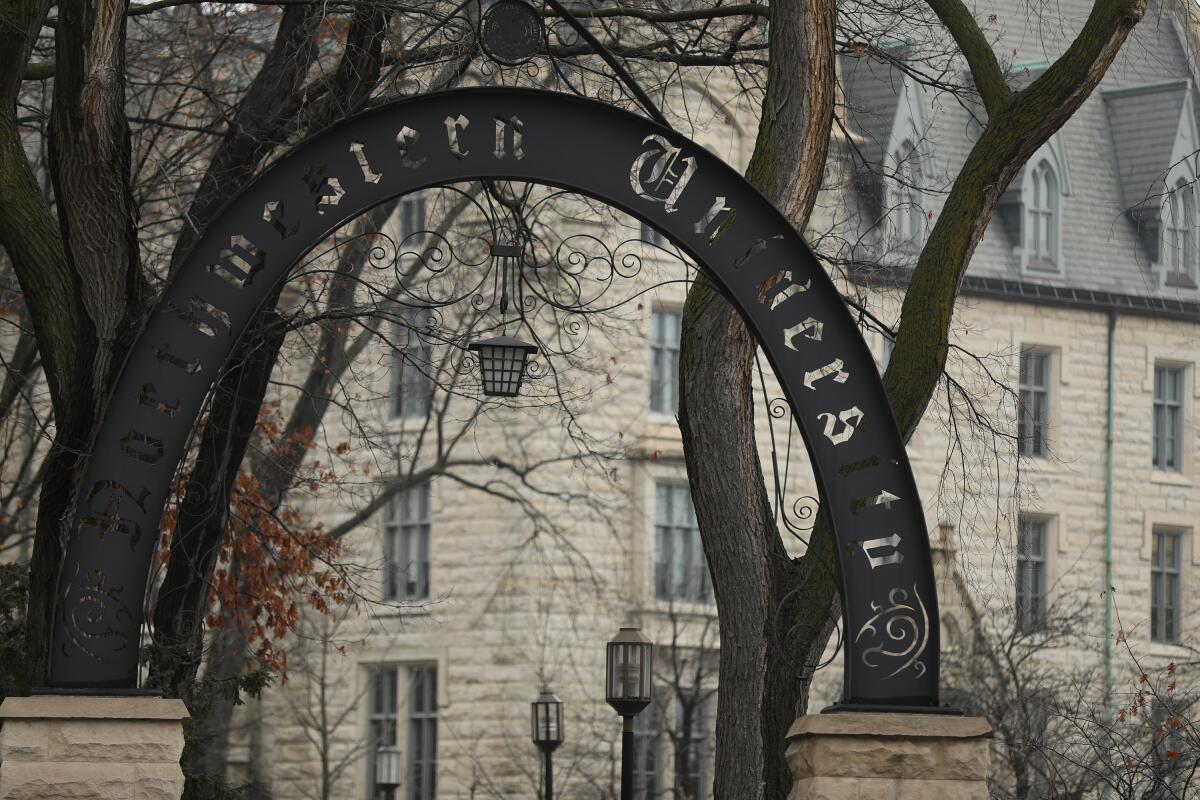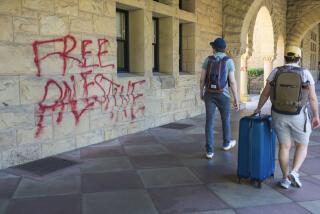Northwestern’s student journalists apologized for doing their job. They shouldn’t have

- Share via
The dog pile was fast and it was intense.
After Northwestern University’s student newspaper, the Daily Northwestern, apologized Sunday for the way it covered a student protest against former Atty. Gen. Jeff Sessions, professional journalists weighed in, and most did not like what they were reading. What kind of journalists would apologize for simply doing their jobs?
The paper had done a thorough job of reporting Sessions’ controversial Nov. 5 appearance; it should have been proud of the work. A reporter had been in the hall, covering the speech, and reporters and a photographer were outside, covering two separate protests. One of the protests got heated when about 150 students tried to crash the hall where Sessions was speaking, some through open windows, others through doors, and were rebuffed by police, according to the Daily Northwestern.
Photographer Colin Boyle tweeted photos that showed some of the protesters’ faces. And before Sessions’ speech, reporters had used a student directory to text some of those planning to protest to ask if they’d consent to be interviewed.
According to the Washington Post, the paper’s editors soon “faced a backlash from student activists, who complained that the university might use pictures of them or their names to punish them.” The paper agreed to remove one protester’s name from a story and Boyle deleted some of his photos from his Twitter feed. The paper also apologized for using the student directory to contact students, calling it “an invasion of privacy.”
“We did not want to play a role in any disciplinary action that could be taken by the University,” said the apology, which was signed by eight of the student paper’s top editors. “When the source in our article requested their name be removed, we chose to respect the student’s concerns for their privacy and safety. As a campus newspaper covering a student body that can be very easily and directly hurt by the University, we must operate differently than a professional publication in these circumstances.”
And: “We feel that covering traumatic events requires a different response than many other stories. While our goal is to document history and spread information, nothing is more important than ensuring that our fellow students feel safe — and in situations like this, that they are benefiting from our coverage rather than being actively harmed by it. We failed to do that last week, and we could not be more sorry.”
So many distressing things are going on in that apology that it’s hard to know where to start.
First, anyone who attends a public protest — even one in the relatively coddled space of today’s college campuses — should not expect privacy. Protests are news events. The very aim of a protest is to bring some level of trauma or distress to the event or person the protest is aimed at, and to garner news coverage in order to amplify the message.
Second, if a reporter contacts someone to ask if they’d like to be interviewed, said person can agree or decline. This is the free press in action, folks. No one has invaded anyone’s privacy.
Third, if students are caught on camera protesting in a manner that might draw the negative attention of university administrators — such as smashing windows or making it impossible for an invited speaker to be heard — they should accept the consequences like the adults they fancy themselves to be.
That any of this has to be spelled out is a sure sign that, when it comes to free speech, things have gotten really weird on college campuses.
A couple of years ago, I stood on Sproul Plaza at my alma mater, UC Berkeley, the birthplace of the Free Speech Movement, interviewing students about why Milo Yiannopoulos, the jejune right-wing provocateur whose career has since imploded, should not be allowed to speak on campus. It was shocking to me that they really, truly believed they needed to be protected from him. Why give an insignificant dope that much power?
I talked about this a short while later over coffee with a couple of fellow Berkeley graduates, all of us free speech nuts. We agreed that if we ran the world, we’d call out the National Guard to protect free speech on campus, to give even the loathsome Milo a mic.
Of course, the irony of the Northwestern students’ “invasion of privacy” backlash is that we are in an era where privacy is practically dead. Instagram, Snapchat, whatever: pictures, or it didn’t happen! And yet students object to news coverage of themselves publicly protesting odious political policies because they may suffer some theoretical harm.
It’s a conundrum, and one that has allowed the language of personal safety to be perverted.
The best explanation for why this has happened comes from UC Berkeley Chancellor Carol Christ, who sat down with my colleague Teresa Watanabe in the midst of the Milo madness.
Today’s students, Christ told Watanabe, “grew up having lots of instructions in anti-bullying, on what constitutes harassment. They’ve been told strongly and repeatedly that certain kinds of speech are inappropriate. And so they don’t understand the difference between how we say it’s right to act in a community, whether it’s a classroom or a dormitory, and what a public speaker is allowed to say in a public square. ... I sometimes say ironically that in 1964 it was the students for free speech and the administration was against it; now you’ve got this weird reversal.”
All journalists get asked to protect people from the consequences of their own behavior or statements. Sometimes someone starts to talk to us, then thinks better of it and asks not to be quoted. If they are young or inexperienced in dealing with the media, we often accede to the request. We’re not here to make people’s lives miserable, I often say, unless they deserve it.
The student protesters at Northwestern should have known they were part of a news event, and that by showing up in public to disrupt an invited speaker, they risked being part of the coverage. The newspaper’s editors acted in good faith, but they erred in apologizing for doing their job, and in being willing to censor their coverage.
Yes, certainly there is a power imbalance between protesting students and the university.The way to address that imbalance is not to conceal the identities of students. It’s to cover the hell out of that story.
Twitter: @AbcarianLAT
More to Read
A cure for the common opinion
Get thought-provoking perspectives with our weekly newsletter.
You may occasionally receive promotional content from the Los Angeles Times.










